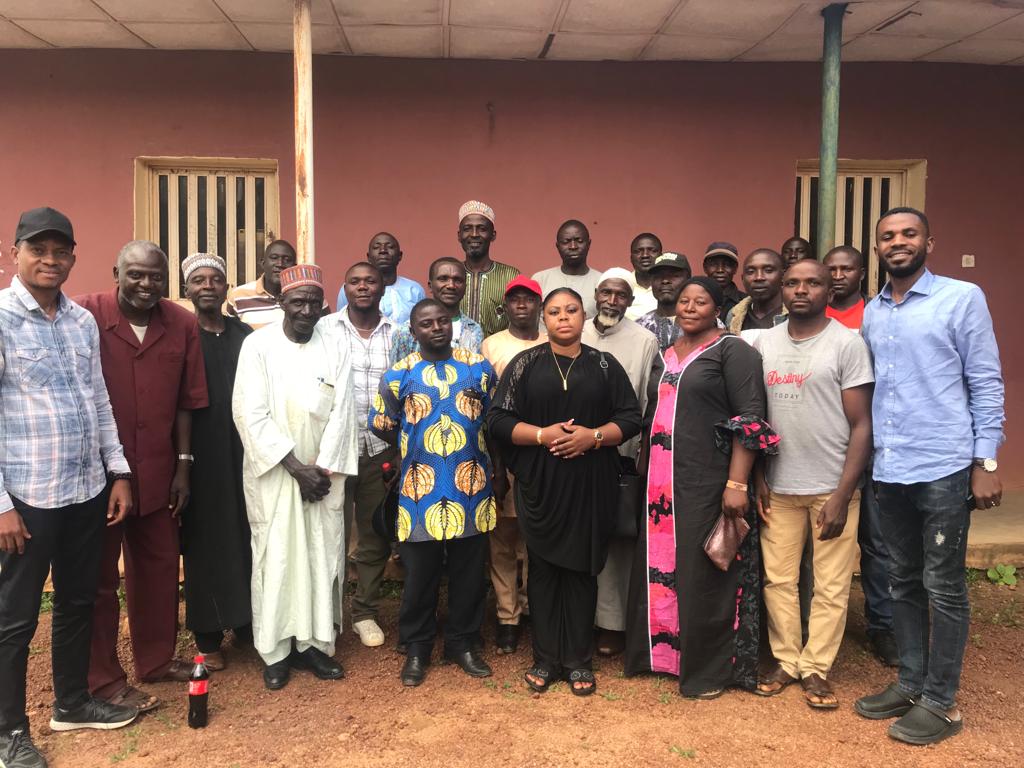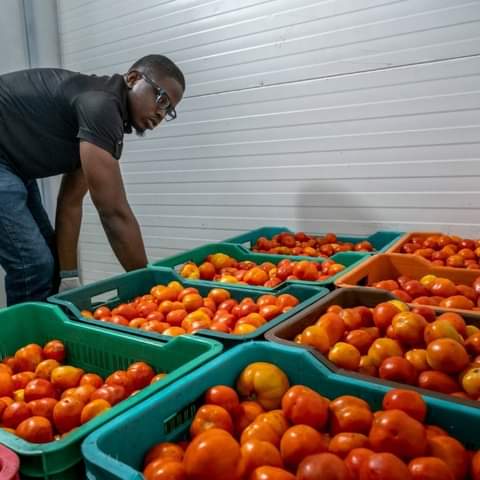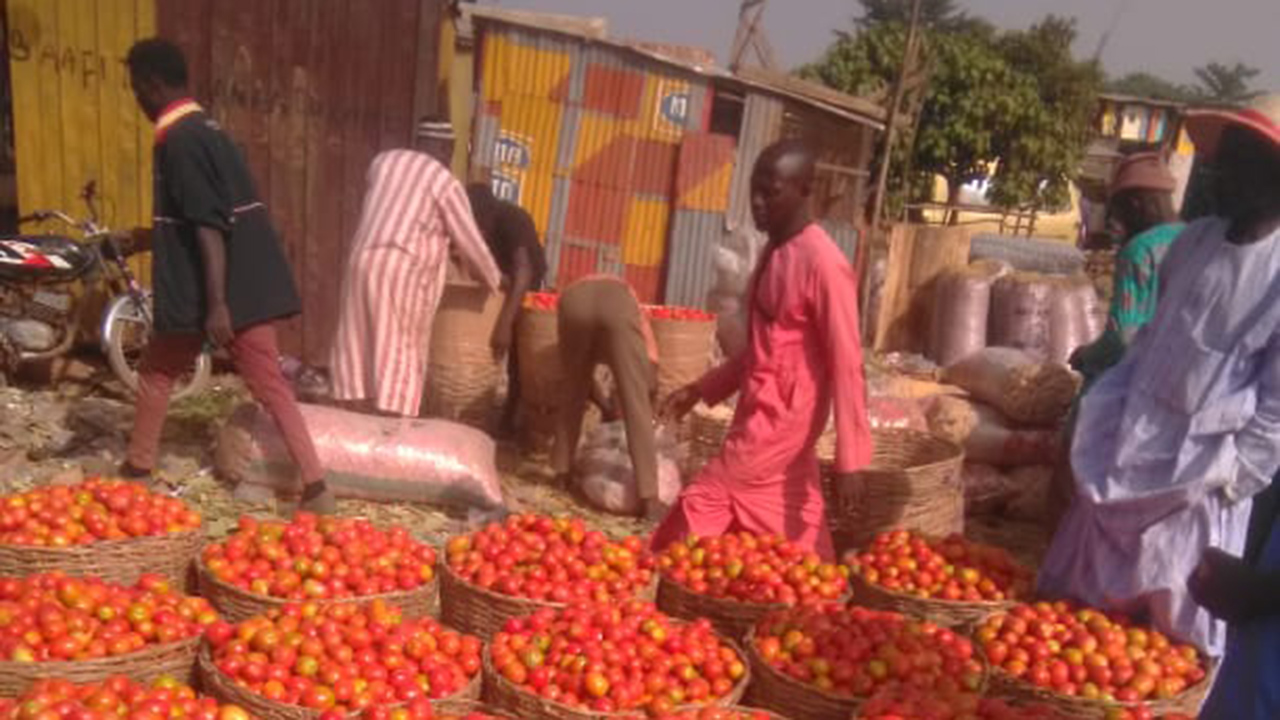Equipping Nigerian Farmers with Drought-Resistant Technology – A Woman-Led Approach
Simkay Green Global Ventures helps smallholder farmers in rural Nigeria adopt low-cost climate-smart cultivation techniques, such as vertical sack farming, enabling year-round production despite changing weather patterns. Led by CEO Ms. Rejoice Amarachi Usim, Simkay is one of 15 winners of the 2021 YouthADAPT Challenge awarded to youth-led African businesses that provide innovative adaptation solutions.
I
n 2022, more than 2.8 million people were impacted by the worst floods to hit Nigeria in a decade. Extreme weather including flooding, rising temperatures and drought threaten Nigeria and its Sahelian neighbors, resulting in land degradation and crop failure, and placing a heavy burden on agricultural systems. Without urgent adaptation measures, food insecurity, displacement and armed conflict are set to rise and will continue to destabilize the region.
Aware of these threats, Ms. Rejoice Amarachi Usim came up with a groundbreaking solution: a company that trains smallholder farmers in rural Nigeria to adapt to the impacts of climate change.

Vertical Sack Farming to Tackle Climate Impacts in Agriculture
Simkay Green Global Ventures is an agricultural enterprise that facilitates training on vertical sack farming, a low-cost technology for planting crops into the sides and tops of large sacks of soil. This type of farming does not rely on rain, optimizes land use and increases crop productivity, even when faced with flooding.
“An increase in our farmers’ yield has resulted in an increase in our farmers’ income. Our solution ensures less greenhouse gas emissions, uses less water, and doesn’t degrade soil,” said Ms. Usim.
Vertical sacks use less water than traditional farming methods, allowing farmers to grow crops even during periods of drought. It also protects farmers from damage caused by flooding.
Simkay also helps farmers transport their harvest to a factory where vegetables are sorted, washed, dehydrated and ground. After production, packed products are distributed through direct purchases and a network of distributors, and promoted using social media.

In 2021, Simkay became one of 15 young African entrepreneurs to win the first edition of the African Youth Adaptation (YouthADAPT) Solutions Challenge. With a strong focus on gender, the YouthADAPT Challenge is an annual competition organized jointly by the African Development Bank (AfDB), Climate Investment Funds (CIF), and the Global Center on Adaptation (GCA) as part of the Africa Adaptation Acceleration Program (AAAP). Every winning business receives a grant of US $100,000 to expand their solutions and the opportunity to participate in a 12-month business accelerator program aimed at growing their companies, maximizing their impact, and generating employment opportunities.
In implementing her company’s agricultural adaptation solution, Ms. Usim declares that she has encountered some challenges.
“Farmers are more used to traditional farming methods and it will take some time for our solution to gain wide acceptance. Currently, a lot of time and money has to be invested in order to drive acceptance of our solution,” she said.
YouthADAPT Helped Boost Engagement, Production Efficiency and Capacity
Simkay generates much of its revenues from selling tomato and potato powder. The company streamlines the process of obtaining produce from farmers by cutting out intermediaries, which boosts farmers’ income and reduces post-harvest losses. The company then dehydrates, grinds, and packages the vegetables and sells the powder to the Nigerian market. Dehydration enables farmers to adapt to changing crop-growing seasons resulting from drought, thereby increasing their income during the off-season and reducing food insecurity.
For Simkay, the YouthADAPT Challenge has translated into an opportunity to get the word out to more smallholder farmers. Ms. Usim explained that in 2022, Simkay worked with 22,000 farmers. This year, she expects to expand their engagement to 100,000 farmers.

As a result of her solution, Simkay’s farmers have improved their yield. In September 2021, before YouthADAPT, Simkay’s production capacity was 21 tons of vegetables, while in 2023, after the year-long program ended, their capacity rose to 33 tons.
With the resources provided by the YouthADAPT program, Simkay will purchase processing machines including a cold storage facility, a five-ton solar dryer, a hammer mill and an automated sealing machine.
“The resources will also be used to address working capital requirements such as seedlings for 22,000 farmers, packaging and branding materials, salaries and other operational costs,” Ms. Usim added.
For Simkay, the future looks bright.
“I hope to train 100,000 farmers by 2030, come up with the best innovations to help mitigate adverse climate challenges and solve food insecurity,” she said.
The AAAP, launched jointly by GCA and the AfDB aims to mobilize US $25 billion for adaptation investments in Africa in the next five years. This Africa-led, Africa-owned initiative has the support of the African Union and African leaders, and focuses on food security, resilient infrastructure, adaptation jobs and climate finance. GCA’s AAAP Upstream Financing Facility incorporates the latest in climate adaptation science and solutions into programs across Africa. In its first year of operation, the Upstream Financing Facility has influenced more than $3.5 billion in downstream investments with Multilateral Development Banks in 19 African nations.